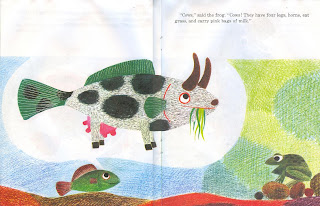“We accept the reality of the world with which we are presented."[1] At least this was the idea that the creators of the Truman Show thought would keep Truman from discovering the truth, and it would have, if his reality hadn’t have been shaken, by some slips from a lover and by to much advertising. Fish is Fish, a children’s picture book by Leo Lionni presents the similar theme for a different audience. The story discusses how our only reference point is what we know, it is our point of comparison, and how it’s very difficult to image outside or beyond this. The concept is surprisingly mature for children especially compared to the norm of stories of loving families, sharing toys, and not being jealous ect. however the moral cant cease to being relevant for all ages.
Alexandre Dumas is well known for saying, ‘There is neither happiness nor misery in the world; there is only the comparison of one state to another, nothing more. He who has felt the deepest grief is best able to experience supreme happiness. We must have felt what it is to die, that we may appreciate the enjoyments of life.’ Perception like reality is subjective not objective- not what is, rather as we see it.
We understand the world through our senses, through the knowledge we obtain through them. Our perception, experiences, and points of comparison affects our view on everything from arts to ethics, God to gas prices- it is by such the tool that allows us 'perceive' our reality. People can only truly understand their own perception of reality. As such communication is often difficult across theses subjunctive playing felid, and as a consequence there is often problems communicating the ‘realities.’
Fish is Fish









No comments:
Post a Comment